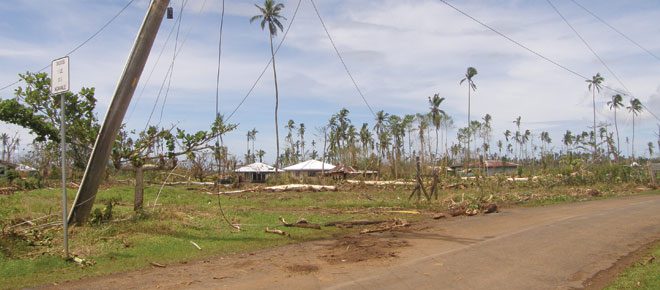Andy Thomson, Oxfam’s Water and Sanitation Advisor, has been in Samoa throughout the cyclone. He is part of a team of assessors, including the Samoan National Disaster Management Office, surveying the damage and determining people’s most urgent needs.

In the aftermath of the storm, the extent of the damage is becoming clear.
Andy Thomson, Oxfam’s Water and Sanitation Advisor, has been in Samoa throughout the cyclone. He is part of a team of assessors, including the Samoan National Disaster Management Office, surveying the damage and determining people’s most urgent needs.
Samoa’s main water treatment plant has suffered major damage and 7700 people have been evacuated.
Thomson said, “A lot of those people left their houses in the night with nothing. Now they’re dispersed in colleges and churches around the city, sharing classrooms with other families. Many of them could remain in evacuation centres for some time.
|
“I spoke to an extended family of 16 people today with six kids. They’re lucky to have all gotten out safely. They essentially have lost everything.” |
I spoke to an extended family of 16 people today with six kids. They’re lucky to have all gotten out safely. They essentially have lost everything.
It’s incredible how quickly something like this can happen. It’s just the sheer volume of water coming down those river systems to the sea. A lot of the logs and debris built up against bridges down near the waterfront – the water had nowhere to go and essentially just spread out over an area of three or four kilometres,” he said.
Responding to humanitarian emergencies is a crucial part of Oxfam’s work. In the short term, we help survivors get through the critical first weeks, and in the longer term we work with communities to build back better, so they are more resilient to future crises.
In Samoa, Oxfam has partnered with Women in Business Development Inc. (WIBDI) since 1991. Through the partnership, hundreds of families are using organic techniques to grow more and better food. This has meant healthier diets, as well as new sources of income, as excess crops are sold in local markets.
Through WIBDI, families are producing virgin organic coconut oil for The Body Shop and organic bananas for export, both of which are generating valuable income. Farmers have also learnt how to save fruit and vegetable seeds, ensuring a consistent supply of food throughout the year. These programmes increase people’s resilience and enable quicker recovery when disaster strikes.
You can help Oxfam support our Pacific neighbours hit by Cyclone Evan.



